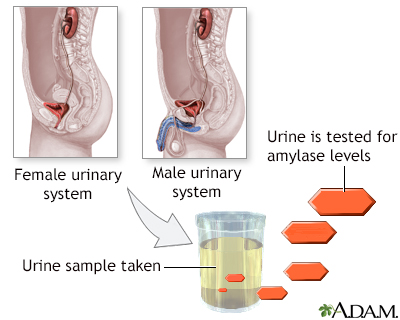Amylase - urine
This is a test that measures the amount of amylase in urine. Amylase is an enzyme that helps digest carbohydrates. It is produced mainly in the pancreas and the glands that make saliva.
Amylase may also be measured with a blood test.
Images



How the Test is Performed
A urine sample is needed. The test may be performed using:
How to Prepare for the Test
Many medicines can interfere with test results.
- Your health care provider will tell you if you need to stop taking any medicines before you have this test.
- Do not stop or change your medicines without talking to your provider first.
How the Test will Feel
The test involves only normal urination. There is no discomfort.
Why the Test is Performed
This test is sometimes done to help diagnose pancreatitis and other diseases that affect the pancreas.
Normal Results
The normal range is 2.6 to 21.2 international units per hour (IU/h).
Normal value ranges may vary slightly among different laboratories. Talk to your provider about the meaning of your specific test results.
The example above shows the common measurement range for results for these tests. Some laboratories use different measurements or may test different specimens.
What Abnormal Results Mean
An increased amount of amylase in the urine is called amylasuria. Increased urine amylase levels may be a sign of:
- Acute pancreatitis
- Alcohol consumption
- Cancer of the pancreas, ovaries, or lungs
- Cholecystitis
- Ectopic or ruptured tubal pregnancy
- Gallbladder disease
- Infection of the salivary glands (called sialoadenitis, may be caused by bacteria, mumps or a blockage)
- Intestinal obstruction
- Pancreatic duct obstruction
- Pelvic inflammatory disease
- Perforated ulcer
Decreased amylase levels may be due to:
- Damage to the pancreas
- Kidney disease
- Macroamylasemia
Related Information
EnzymeAcute pancreatitis
Pancreatic cancer
Acute cholecystitis
Ectopic pregnancy
Mumps
Alcohol use and safe drinking
Intestinal obstruction and Ileus
Bile duct obstruction
Peptic ulcer
Preeclampsia
References
Siddiqi HA, Rabinowitz S, Axiotis CA. Laboratory diagnosis of gastrointestinal and pancreatic disorders. In: McPherson RA, Pincus MR, eds. Henry's Clinical Diagnosis and Management by Laboratory Methods. 24th ed. Philadelphia, PA: Elsevier; 2022:chap 23.
Vege SS. Acute pancreatitis. In: Feldman M, Friedman LS, Brandt LJ, eds. Sleisenger and Fordtran's Gastrointestinal and Liver Disease. 11th ed. Philadelphia, PA: Elsevier; 2021:chap 58.
BACK TO TOPReview Date: 8/20/2023
Reviewed By: Jacob Berman, MD, MPH, Clinical Assistant Professor of Medicine, Division of General Internal Medicine, University of Washington School of Medicine, Seattle, WA. Also reviewed by David C. Dugdale, MD, Medical Director, Brenda Conaway, Editorial Director, and the A.D.A.M. Editorial team.

Health Content Provider
06/01/2025
|
A.D.A.M., Inc. is accredited by URAC, for Health Content Provider (www.urac.org). URAC's accreditation program is an independent audit to verify that A.D.A.M. follows rigorous standards of quality and accountability. A.D.A.M. is among the first to achieve this important distinction for online health information and services. Learn more about A.D.A.M.'s editorial policy, editorial process and privacy policy. A.D.A.M. is also a founding member of Hi-Ethics. This site complied with the HONcode standard for trustworthy health information from 1995 to 2022, after which HON (Health On the Net, a not-for-profit organization that promoted transparent and reliable health information online) was discontinued. |
The information provided herein should not be used during any medical emergency or for the diagnosis or treatment of any medical condition. A licensed medical professional should be consulted for diagnosis and treatment of any and all medical conditions. Links to other sites are provided for information only -- they do not constitute endorsements of those other sites. © 1997- 2025 A.D.A.M., a business unit of Ebix, Inc. Any duplication or distribution of the information contained herein is strictly prohibited.
